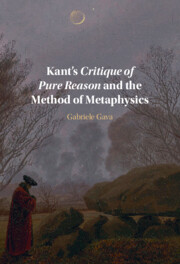Book contents
- Kant’s Critique of Pure Reason and the Method of Metaphysics
- Kant’s Critique of Pure Reason and the Method of Metaphysics
- Copyright page
- Dedication
- Contents
- Acknowledgements
- Citations of Kant’s Works
- Introduction
- Part I Metaphysics as a Science and the Role of the Critique of Pure Reason
- Chapter 1 The Worldly Concept of Philosophy and the Possibility of Metaphysics as a Science
- Chapter 2 The Critique of Pure Reason as the Doctrine of Method of Metaphysics
- Part II The Method of Transcendental Philosophy
- Part III The Method of the Critique of Pure Reason
- Part IV Kant on Dogmatism and Scepticism
- Bibliography
- Index
Chapter 2 - The Critique of Pure Reason as the Doctrine of Method of Metaphysics
from Part I - Metaphysics as a Science and the Role of the Critique of Pure Reason
Published online by Cambridge University Press: 11 May 2023
- Kant’s Critique of Pure Reason and the Method of Metaphysics
- Kant’s Critique of Pure Reason and the Method of Metaphysics
- Copyright page
- Dedication
- Contents
- Acknowledgements
- Citations of Kant’s Works
- Introduction
- Part I Metaphysics as a Science and the Role of the Critique of Pure Reason
- Chapter 1 The Worldly Concept of Philosophy and the Possibility of Metaphysics as a Science
- Chapter 2 The Critique of Pure Reason as the Doctrine of Method of Metaphysics
- Part II The Method of Transcendental Philosophy
- Part III The Method of the Critique of Pure Reason
- Part IV Kant on Dogmatism and Scepticism
- Bibliography
- Index
Summary
In a passage in both editions of the Critique of Pure Reason, Kant describes what he wants to accomplish there as a ‘doctrine of method’ (A82–3/B108–9). In the B-Preface, he adds that the Critique ‘is a treatise on the method’ (Bxxii). In this chapter, I argue that the best way to understand these claims is to see them as an indication that the Critique is the doctrine of method of metaphysics. I start by clarifying what a doctrine of method is for Kant and distinguish between the doctrine of method of general logic and the doctrines of method of particular sciences. In a second step, I argue that the Transcendental Doctrine of Method is the particular doctrine of method of metaphysics. Furthermore, I explain how this is compatible with regarding the whole Critique as the doctrine of method of metaphysics. Since cognitions belonging to a science must already be established in order for a doctrine of method to perform its task, the Transcendental Doctrine of Method requires that at least some doctrinal parts of metaphysics be established in the Transcendental Doctrine of Elements. I argue that this has important consequences for how we should depict the relationship between the critique of pure reason and transcendental philosophy.
Keywords
- Type
- Chapter
- Information
- Publisher: Cambridge University PressPrint publication year: 2023

